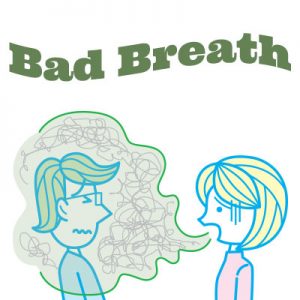 It’s often said that a true friend will tell you if you have bad breath. Bad breath, formally known as halitosis, is embarrassing and can hold you back from truly enjoying your life and social situations. Like a good friend, Carolina Complete dentists Dr. Barganier, Dr. Zuffi, Dr. Williams, and Dr. McAdams will tell it to you straight. Read more below to determine what to do about your bad breath.
It’s often said that a true friend will tell you if you have bad breath. Bad breath, formally known as halitosis, is embarrassing and can hold you back from truly enjoying your life and social situations. Like a good friend, Carolina Complete dentists Dr. Barganier, Dr. Zuffi, Dr. Williams, and Dr. McAdams will tell it to you straight. Read more below to determine what to do about your bad breath.
Is Bad Breath Normal?
Yes. Sorry. But some bad breath is just unavoidable. Moderate and occasional bad breath is caused by the normal break down of foods for digestion. Most people don’t wake up with minty fresh breath because bacteria build up in your mouth overnight while you are sleeping. Keep normal bouts of bad breath at bay with good oral hygiene, by drinking plenty of water, and by chewing sugar-free gum containing xylitol.
Lifestyle vs. Medical Causes of Bad Breath
Your lifestyle or daily habits may cause you unusually bad breath. There are some things you can do every day to keep bad breath at bay:
- Brush your teeth twice a day (and don’t forget your tongue!)
- Floss once a day
- Keep dentures & other oral appliances clean
- Stop smoking
- Eat a healthy diet including a variety of foods and enough calories
- Avoid odorous foods like coffee, garlic, and onions
However, a larger medical issue can cause constant and/or severe bad breath:
- Dry mouth
- Lung, kidney, and liver problems
- Gum disease
- Respiratory illness like colds and sinus infections
- Acid reflux
If you think your bad breath might be linked with other health issues, see your Carolina Complete dentists immediately. You might need more tests to determine the cause.
How Do I Get Rid of Bad Breath?
A dentist will be able to review your medical history and closely examine your mouth to determine what might be causing your bad breath. It’s likely that the dentist will recommend some diet and lifestyle changes to improve your breath and overall health. Time to get friendly with your toothbrush!
Like all good friendships, quality time with your Carolina Complete dentists is an important factor in your oral health success. A good relationship with your Carolina Complete Dental, including visits at least twice a year, will help you avoid bad breath and many other oral health issues. Make an appointment with us today to see us for a consultation or cleaning!
The content of this blog is not intended to be a substitute for professional medical advice, diagnosis, or treatment. Always seek the advice of qualified health providers with questions you may have regarding medical conditions.
Sources
http://www.colgate.com/en/us/oc/oral-health/conditions/bad-breath/article/halitosis
http://www.mouthhealthy.org/en/az-topics/h/halitosis
